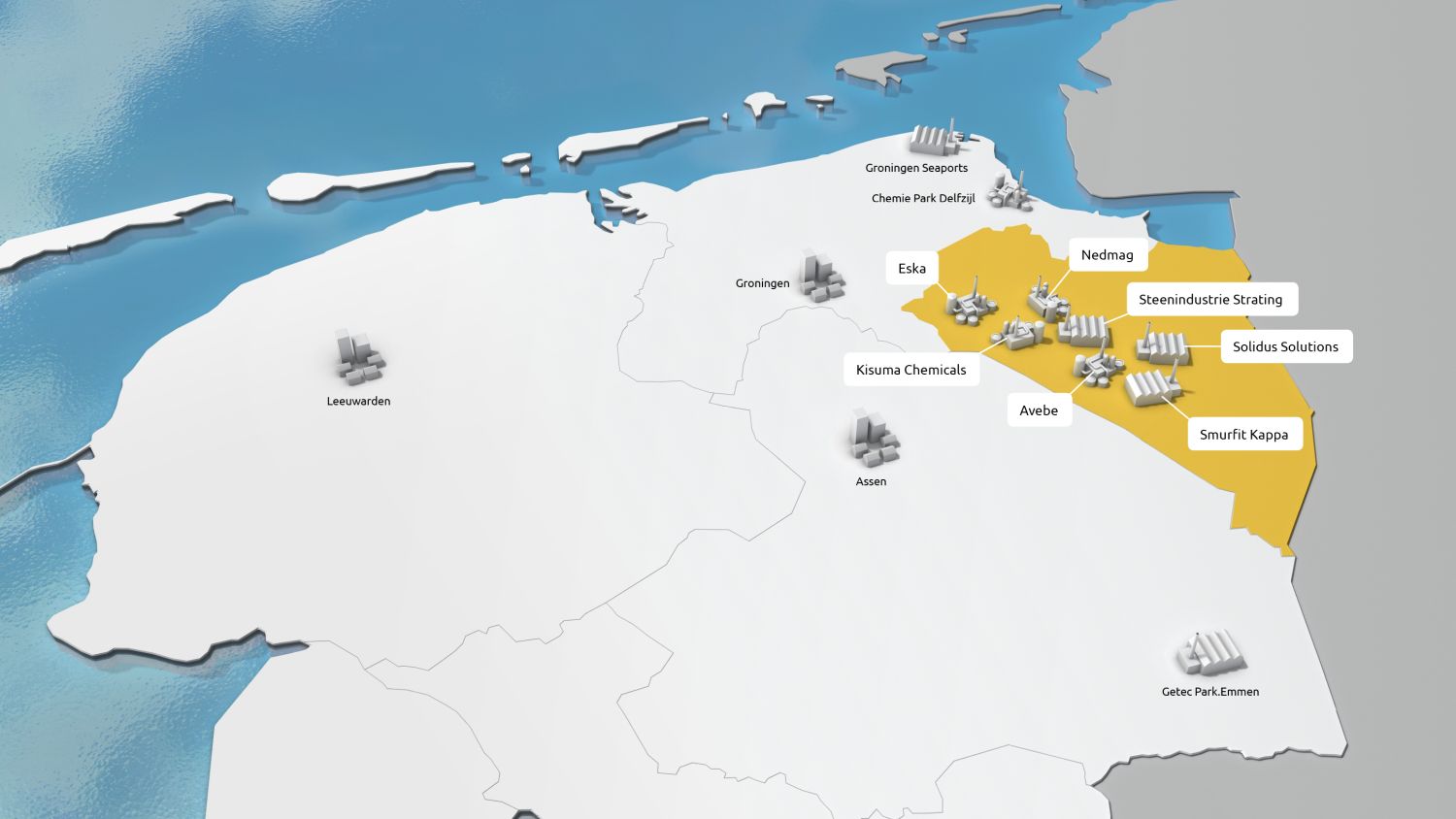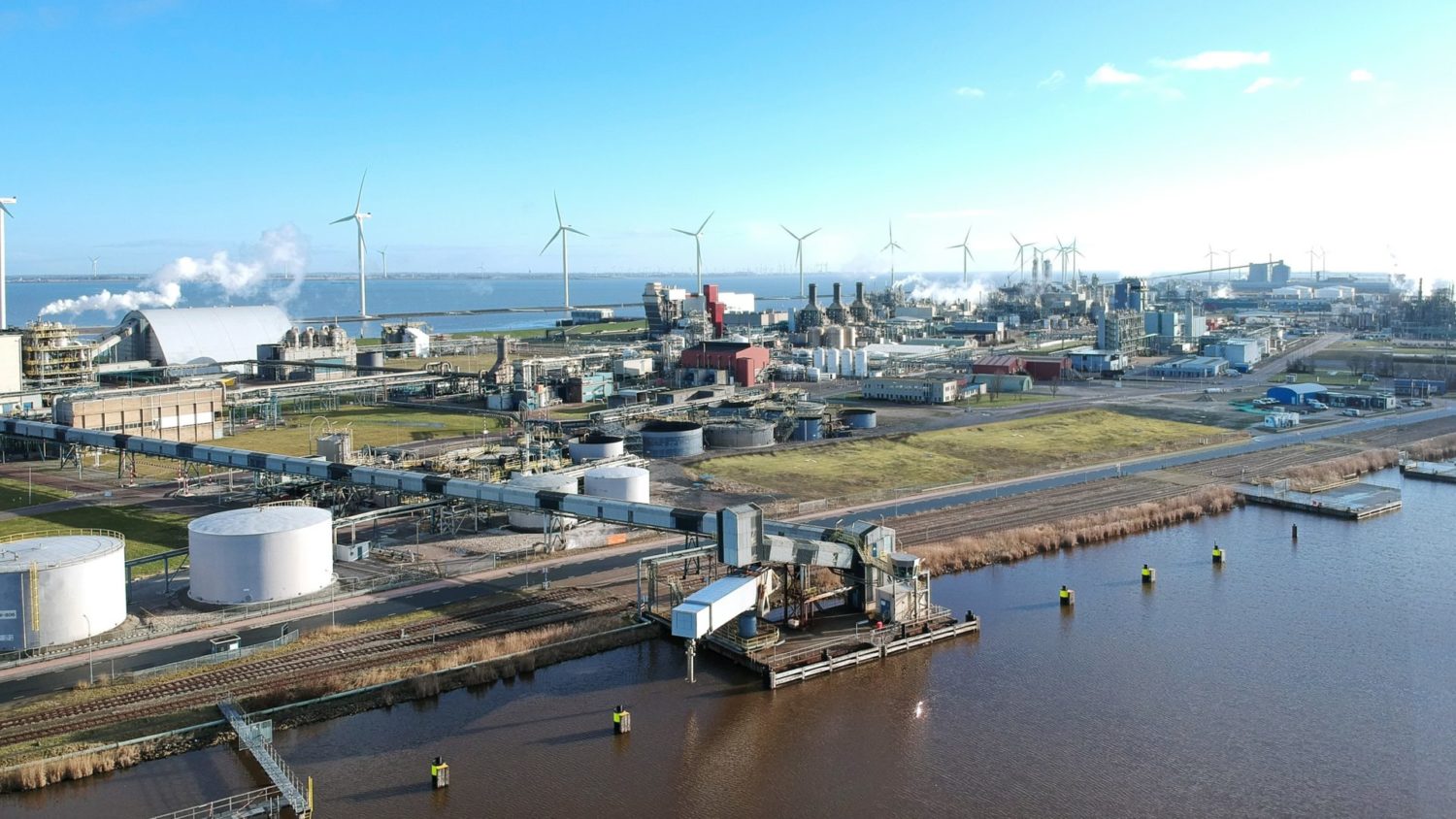
Getting off the gas, becoming CO2-neutral, withstanding prices spiraling out of control. Just imagine being in the energy-intensive industry. Then you have challenges growing over your head. So work together! That is exactly why the East Groningen Industry Cluster exists.
Seven factories, spread over a sizeable area. Each with its own markets, its own systems, its own processes, its own products and services, its own way of working. Most of it is proprietary, frankly. But they do have a common challenge, and not such a small one: all that energy they consume must be CO2 neutral in a while. All seven of the factories have to deal with energy-guzzling heat processes, to make things a little trickier.
At the well-known Climate Tables, which have been participating since 2018 on how to achieve the climate goals, there was already considerable discussion. Especially by the large, existing industrial clusters in the Netherlands. But what about the manufacturing companies that are not on one site? Like Nedmag in Veendam, Solidus Solutions in places like Bad Nieuweschans and Oude Pekela, Steenindustrie Strating in Oude Pekela, Avebe in places like Ter Apelkanaal and Gasselternijveen, Eska in Midden-Groningen, Kisuma Chemicals in Veendam, Smurfit Kappa in Nieuwe Pekela. These are all major energy consumers that need to get down to business.
"Companies that are in the same industrial area almost naturally work together on issues like this," Hans Bakker says. He has been appointed by the seven companies as quartermaster, as advisor, as chairman of the consultation, as instigator of solutions. 'The energy transition is too big for each individual company to tackle alone. Then it is better to work together. To share knowledge and exchange ideas, but also to make a fist, to be an interesting discussion partner for governments and grid managers, for energy companies, and certainly also for new entrants to the sustainable energy market. VoltH2's recent reporting on the building of an electrolyzer in Delfzijl for the production of green hydrogen is an example of this.'
We want to accelerate
Of course, the seven companies have been working separately on sustainability for years. Using energy more economically, better installations and production lines, everyone is busy with that. 'But this goes further,' says Geert Jan Strating of the brickworks of the same name in Oude Pekela. 'This is a complete change of the system. The way it was arranged is going to be shaken up. Natural gas now flows to everyone's front door, so to speak, but that's coming to an end. And exactly what we will get in its place is still unclear.'
Sitting back and waiting until it is clear how to proceed is a bad idea. Better to choose the attack. In the case of the collaborating companies in East Groningen, that means thinking about the best possible solutions, talking to governments, network operators, energy companies, local residents, experts, entire networks and ecosystems. Together, of course, this works better.
'We don't just want to think and consult. We really want to accelerate the process of sustainability,' says Bakker. 'That means we are trying things out or are going to start doing them soon. Blending green hydrogen, for example. We are looking at whether we can work together with market parties here who have plans for smaller-scale electrolyzers that we can use for the regional production of hydrogen. And so more possible solutions pass by. We take the position that it is better to start small-scale now than to wait for the big solutions to come from above. We are looking at the old business case in a new, regional way and therefore have the opportunity to play a guiding role.'
Starting from one's own strengths
By that, Bakker means that the challenge is not just approached along the lines of the old infrastructure. No, the goals are being unraveled, the possibilities considered and steps taken. And so the East Groningen Industry Cluster becomes an interesting party for entrepreneurs engaged in the energy transition. With hydrogen, for example, or electrification, or lesser-known techniques. Whichever it becomes: the companies will be faced with substantial investments. Wrong guesses are a bad idea. Therefore, coming to conclusions together is better, as is keeping up to date with developments.
Bert Bodewes, as CSR manager, is in charge of the energy issue at Eska board factory. 'I find it strong that we have now decided to look primarily at our own strengths. What role can I play in solving the puzzle? We can learn from each other and strengthen each other. Here and there it might even be possible to make use of each other's heat.
Tackling the many-headed CO2 monster together Getting rid of the gas, becoming CO2-neutral, resisting skyrocketing prices. Just imagine being active in the energy-intensive industry. Then you have challenges growing over your head. So work together! That is exactly why Industriecluster Oost-Groningen exists. That is essentially the second track. The first is much more about involving all parties involved with energy. Bodewes: "Look, for clusters like those in Delfzijl and Emmen it is obvious that they are sitting around the table with Enexis and Gasunie. Of course that doesn't apply to individual companies in the area in between. But together we can get that done. And that increases the possibilities on the route to CO2 neutral. It also gives us the chance to act in the discussion instead of waiting to see what comes our way.'

East Groningen industry cluster (seven companies working together on energy transition)
Rising prices are incident
And then the seven parties have to take out what takes them forward. And that certainly does not have to be the same for all of them. Whereas most of the companies are mainly looking for heat, Nedmag and also Steenindustrie Strating need fire in their production process. Strating: "That makes it a little more complicated. To get the right color and quality, we need a flame. Just heat is not enough. So for us, electrification doesn't work.'
That exposes that there is no simple alternative to the perfect infrastructure of natural gas we have now. Green hydrogen doesn't seem like an illogical candidate, but then a lot more of it has to be made. As an industry, I think we are quite willing to have pipelines built, but then we need to know what will flow through them. That's typically why such a cluster makes sense. We're at the table early, we hear something more and can have a say.'
With energy prices rather on the rise in recent months, the urgency to switch from fossil to renewable energy sources seems extra evident. 'Well, that's true for households, but less so for industry. In your planning you should not respond based on incidents. And so I call prices anyway. What is worse than the high prices is global competitiveness. The US produces its own oil and gas, so the energy component in costs is smaller there.'
At Strating, energy historically makes up about 20 percent of costs. That fluctuates somewhat. At the end of the eighties the percentage was also very high, then it became less, until now. Yes, I have to say: if the fixed part of our energy contract expires under these circumstances, we will be dealt quite a blow. But we can't really respond now. Electricity is also expensive; there are not enough good alternatives. If energy prices get too high and we can't pass on the costs, then things will just get tighter. And then it could well be that we get a bit stuck between the high cost of old energy and the lack of investment space for new technologies. I hope it doesn't get that far.
In any case, the payback period for renewable forms of energy is rapidly shortening. Hans Bakker thinks that for this reason the rising prices of fossil fuels are a good incentive. "These are turbulent times for the companies in this transition, but the solution is getting closer.


